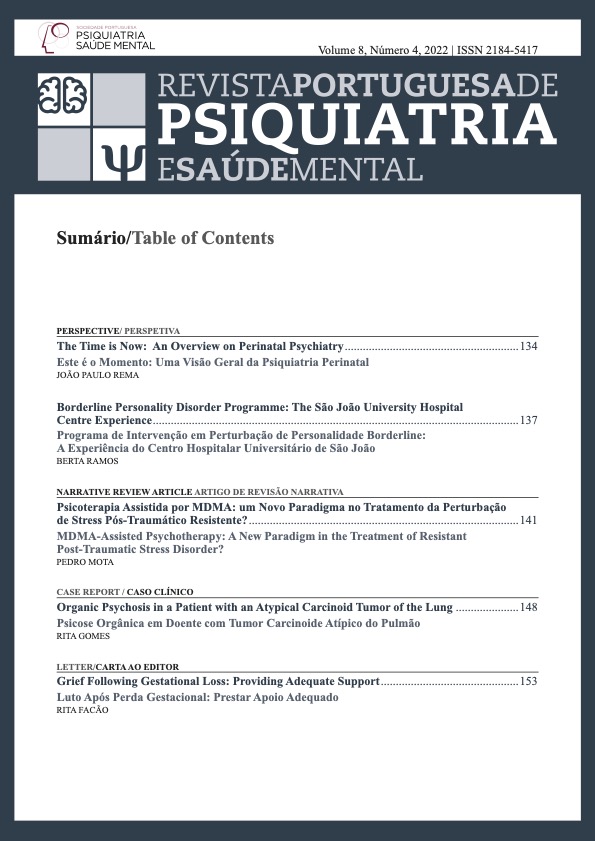MDMA‐Assisted Psychotherapy: A New Paradigm in the Treatment of Resistant Post‐Traumatic Stress Disorder?
DOI:
https://doi.org/10.51338/rppsm.327Keywords:
Hallucinogens, N‐Methyl‐3,4‐methylenedioxyamphetamine, Psychotherapy, Stress Disorders, Post‐TraumaticAbstract
Post‐traumatic stress disorder (PTSD) is a common psychiatric illness, usually chronic, with severe implications for the quality of life of the affected person and their family, and which has been increasingly recognized as a Public Health problem. In the last two decades, clinical studies with 3,4‐methylenedioxymethamphetamine (MDMA) have been demonstrating its promising role as a psychotherapeutic catalyst in patients with PTSD, and in 2017 MDMA‐assisted psychotherapy was named breakthrough therapy by the Food and Drug Administration (FDA).
These studies have been replicated in several locations around the world, according to strict protocols, and its approval for clinical use is currently scheduled for 2023. In May 2021, the first results of phase III studies were published, in which participants who received MDMA‐Assisted Psychotherapy experienced a significant and lasting reduction in PTSD symptoms. The acute prosocial and interpersonal effects of MDMA have been shown to significantly improve
the quality of the therapeutic alliance, enhancing adherence to PTSD treatment and its outcome. Clinicians suggest that MDMA can catalyze therapeutic processing, allowing patients to remain emotionally engaged while revisiting traumatic experiences without becoming overwhelmed.
Taking into account the prevalence of PTSD and the limitations found with currently available treatments, a literature review was carried out with the aim of examining the use of MDMA assisted psychotherapy in post‐traumatic stress disorder, presenting a historical contextualization of this molecule, its potential effects on different symptoms of this disorder and identifying priority areas for intervention and future investigations.
Downloads
References
Morina N, Wicherts JM, Lobbrecht J, Priebe S. Remission from post-traumatic stress disorder in adults: a systematic review and meta-analysis of long term outcome studies. Clinical psychology review. 2014;34(3):249-55.
Shiner B, D’Avolio LW, Nguyen TM, Zayed MH, Young-Xu Y, Desai RA, et al. Measuring use of evidence based psychotherapy for posttraumatic stress disorder. Administration and Policy in Mental Health and Mental Health Services Research. 2013;40(4):311-8.
Steenkamp MM, Litz BT, Hoge CW, Marmar CR. Psychotherapy for military-related PTSD: A review of randomized clinical trials. Jama. 2015;314(5):489-500.
Erbes CR, Curry KT, Leskela J. Treatment presentation and adherence of Iraq/Afghanistan era veterans in outpatient care for posttraumatic stress disorder. Psychological Services. 2009;6(3):175.
Fortney JC, Pyne JM, Edlund MJ, Stecker T, Mittal D, Robinson DE, et al. Reasons for antidepressant nonadherence among veterans treated in primary care clinics. The Journal of clinical psychiatry. 2010;71(6):16967.
Feduccia AA, Jerome L, Klosinski B, Emerson A, Mithoefer MC, Doblin R. Breakthrough for trauma treatment: safety and efficacy of MDMA-assisted psychotherapy compared to paroxetine and sertraline. Frontiers in psychiatry. 2019;10:650.
Mitchell JM, Bogenschutz M, Lilienstein A, Harrison C, Kleiman S, Parker-Guilbert K, et al. MDMA-assisted therapy for severe PTSD: a randomized, double-blind, placebo-controlled phase 3 study. Nature Medicine. 2021;27(6):1025-33.
Bernschneider-Reif S, Öxler F, Freudenmann R. The origin of MDMA (‘ecstasy’)–separating the facts from the myth. Die Pharmazie-An International Journal of Pharmaceutical Sciences. 2006;61(11):966-72.
Doblin R, Greer G, Holland J, Jerome L, Mithoefer MC, Sessa B. A reconsideration and response to Parrott AC (2013)“Human psychobiology of MDMA or ‘Ecstasy’: an overview of 25 years of empirical research”. Human Psychopharmacology: Clinical and Experimental. 2014;29(2):105-8.
Sessa B, Higbed L, Nutt D. A review of 3, 4-methylenedioxymethamphetamine (MDMA)-assisted psychotherapy. Frontiers in psychiatry. 2019;10:138.
Mithoefer MC, Wagner MT, Mithoefer AT, Jerome L, Doblin R. The safety and efficacy of±3, 4-methylenedioxymethamphetamine-assisted psychotherapy in subjects with chronic, treatment-resistant posttraumatic stress disorder: the first randomized controlled pilot study. Journal of psychopharmacology. 2011;25(4):439-52.
Dunlap LE, Andrews AM, Olson DE. Dark classics in chemical neuroscience: 3, 4-methylenedioxymethamphetamine. ACS chemical neuroscience. 2018;9(10):2408-27.
Liechti ME, Saur MR, Gamma A, Hell D, Vollenweider FX. Psychological and physiological effects of MDMA (“Ecstasy”) after pretreatment with the 5-HT2 antagonist ketanserin in healthy humans. Neuropsychopharmacology. 2000;23(4):396-404.
Baggott MJ, Coyle JR, Siegrist JD, Garrison KJ, Galloway GP, Mendelson JE. Effects of 3, 4-methylenedioxymethamphetamine on socioemotional feelings, authenticity, and autobiographical disclosure in healthy volunteers in a controlled setting. Journal of psychopharmacology. 2016;30(4):378-87.
Bedi G, Hyman D, de Wit H. Is ecstasy an “empathogen”? Effects of±3, 4-methylenedioxymethamphetamine on prosocial feelings and identification of emotional states in others. Biological psychiatry. 2010;68(12):1134-40.
Pentney AR. An exploration of the history and controversies surrounding MDMA and MDA. Journal of psychoactive drugs. 2001;33(3):213-21.
Greer GR, Tolbert R. The therapeutic use of MDMA. Ecstasy: The clinical, pharmacological and neurotoxicological effects of the drug MDMA: Springer; 1990. p. 21-35.
Doblin R. A clinical plan for MDMA (Ecstasy) in the treatment of posttraumatic stress disorder (PTSD): partnering with the FDA. Journal of psychoactive drugs. 2002;34(2):185-94.
Tedesco S, Gajaram G, Chida S, Ahmad A, Pentak M, Kelada M, et al. The Efficacy of MDMA (3, 4-Methylenedioxymethamphetamine) for Post-traumatic Stress Disorder in Humans: A Systematic Review and Meta-Analysis. Cureus. 2021;13(5).
Feduccia AA, Mithoefer MC. MDMA-assisted psychotherapy for PTSD: are memory reconsolidation and fear extinction underlying mechanisms? Progress in neuro-psychopharmacology and biological psychiatry. 2018;84:221-8.
Ferrajão PC. Pathways between combat stress and physical health among Portuguese war veterans. Qualitative health research. 2017;27(11):1640-51.








